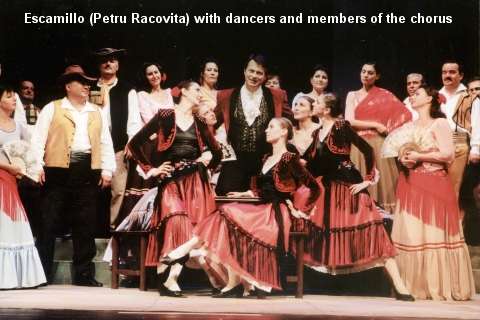|
<< -- 5 -- Roderic Dunnett MIXED RESULTS

Samoila begins and rounds off every phrase meticulously, and keeps both
players and singers on a tight lead (you can see it in his minimalist gestures)
: witness the predominating string pianissimi (at times quadruple
piano), with not a single violin adrift -- for Carmen's habanera,
or the muted arrival of the cellos with the fate theme; likewise (with cor
anglais) for the end of Act II; admirable restraint for the Act III card
scene, to chilling effect; and what sounds like a Straussian string sextet
for Escamillo's nocturnal exit in the same act. All woodwind did well :
a bassoon march with double flutes (as impudent as Tchaikovsky and eerie
as Shostakovich), some fine oboe launching Act IV (making amends for the
oboe mistuning that heralded Carmen's rose-greeted arrival in Act I), plus
the cor anglais virtually grieving for her later on.
Several times in Act I, when the conductor needs to accompany and give,
not command, Samoila's unhurried, Parsifalian approach -- true, the 'fate'
music is pure Mussorgsky -- lets the orchestra flag, a whole third of a beat
behind the singers. He should have yielded, for the initial dramatic limpness
was in large measure down to him. Harp and flute (with clarinet added) launched
a hazily beautiful Siegrified Idyll of an Act III prelude -- albeit
never quite cranked up to a climax.
The result overall, however, was an intelligent, unshowy Carmen,
lucid in its storytelling, believable in its psychology, and especially
effective in pointing up Bizet's darker writing -- a constant ebb and flow,
like an ineluctable tide beneath the voices, militating against the brightness
elsewhere in the score.
The audience liked Natalia Josan's Micaela, who came into her own by
Act III, where her 'mother' theme, recapitulated from the (static, but rather
finely delivered) Micaela-José duet in Act I, makes Bizet sound like
pure Dvorák. I liked several touches from Ion Cvasniuc's oldish Morales;
I should have preferred him as Zuniga. Irina Jarchih's Mercedes needs more
oomph, but she paired finely in Mozart-like duet with the seasoned Elena
Gherman's confident Frasquita : the Act III cards exchange heralding Carmen's
gloomy musings was bewitching, as was the female trio near the end.
Gherman, you feel, could attack any role from Bellini to Berg with ability
and aplomb. Petru Racovita (the bullfighter Escamillo) felt below peak here,
but held his own because his French is as excellent as Lavric's; and he
has presence even when his back is turned. Two of his Escamillo scenes were
strong -- reliable, if unremarkable; one was magnificent. His Alfio (in Cavalleria
Rusticana) was a bit like that -- vocally impressive, if a bit bland
in character; but his Marcello (in Chisinau's La Bohème) was
good, and his Figaro attractive and versatile.

Continue >>
Copyright © 11 October 2001
Roderic Dunnett, Coventry, UK
 OPERA AND BALLET INTERNATIONAL
<< Music
& Vision home
Stephen Dodgson >>
OPERA AND BALLET INTERNATIONAL
<< Music
& Vision home
Stephen Dodgson >>
|

